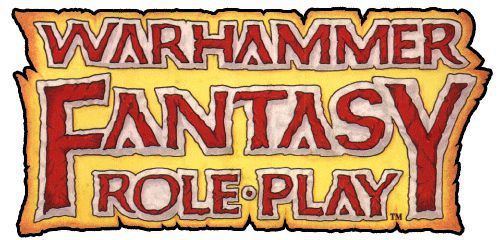
In anticipation of the upcoming release of 4th Edition Warhammer Fantasy RPG, I thought I might review my history of playing WFRPG and my current set of gripes with the system.
First Edition
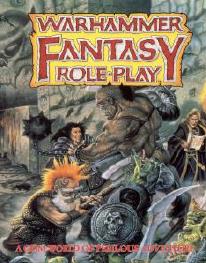 I vaguely recall playing 1st edition WFRPG back in college. I personally never owned this book back then, so I was only ever a player. In my youth I was all about D&D, and Warhammer as an IP was only vaguely on my radar. I think I did own a box-set of Fantasy Battles 4th edition, but I never had anyone with whom to play it. Honestly, it was probably Warhammer Quest that really plunged me into the IP finally in 1995. Even after that though I still played mostly other RPGs, and thought that WHQ played best as a board game.
I vaguely recall playing 1st edition WFRPG back in college. I personally never owned this book back then, so I was only ever a player. In my youth I was all about D&D, and Warhammer as an IP was only vaguely on my radar. I think I did own a box-set of Fantasy Battles 4th edition, but I never had anyone with whom to play it. Honestly, it was probably Warhammer Quest that really plunged me into the IP finally in 1995. Even after that though I still played mostly other RPGs, and thought that WHQ played best as a board game.
I do now own a copy of the 1st edition book for WFRPG (thanks Adam!), but I never really dug into it. Even friends who played 1st said that 2nd edition was better refined and overall an improvement, so with neither the nostalgia for this game nor a strong sense of the original being a better system, I really kind of glossed this one over.
Second Edition
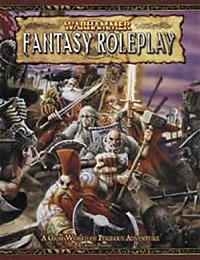 WFRPG 2e came out in 2004, which happens to also be the year I started going to GenCon again. I’m pretty sure that my friend Scott, who at one point owned a nearby GW shop, introduced us to this game, but both Jenn and I are having a lot of trouble remembering that. It seems a reasonable assumption though.
WFRPG 2e came out in 2004, which happens to also be the year I started going to GenCon again. I’m pretty sure that my friend Scott, who at one point owned a nearby GW shop, introduced us to this game, but both Jenn and I are having a lot of trouble remembering that. It seems a reasonable assumption though.
This is Jenn’s game of choice, and as such I ran it a lot to entice her into playing. To be fair, I also really enjoyed this game. I absolutely adore the grim dark setting. I probably purchased every book in this line, and there are some real gems. Karak Azgul and Lure of the Liche Lord are great dungeons, and Renegade Crowns is an amazing resource for building your own sandbox. I embedded the former two in locations generated by Renegade Crowns and ran a good long campaign out of it.
All that said, here are my gripes about this system which I really hope to see addressed in the new one:
Combat slows as you level up. Higher levels come with more attacks, and more chances to negate attacks (parry, dodge, etc.), and a greater chance at succeeding. Thus where at low level you made one roll and hit if you were lucky, now each turn is a series of three attempts, each very likely hitting and very likely being negated by the opponent. Combat really starts to drag at the higher end of the power curve.
No follow through on careers. The career ladder is very evocative and it’s easy for players to get excited about making their way up the ladder. But while it makes sense for a mercenary, bone picker, and camp follower to hang out together trying to make names for themselves, down the road you wonder why a pirate captain, inn keeper, and high priest go off on adventures together. The high level careers tend to be things that you would expect are counter to an adventuring life, and finding ways to let players feel like they’re participating in that career becomes increasing difficult. Worst of all, there’s absolutely no guidance in how to make the careers significant in a game, so mostly you just end up ignoring the very cool flavor and the careers just become gates to new abilities.
Fate and fortune. I’ve come to agree with Delta that any system that allows points to completely negate action, be it fate/fortune in WFRPG or benes in Savage Worlds, is simply not satisfying. Sure, it gives the players some power to influence the flow of the game, but having to go back and retcon a whole bunch of stuff that we all bought into having already happened is never satisfying. The guidelines for handing out these points is also always very soft, and you end up just having to make it up as GM and inevitably feel like either you’ve given out too much, not enough, or imbalanced the distribution across your players.
Magic is too hard. The magic system in this game is very evocative and cool, but it makes it really hard to get access to spells, to successfully cast spells, and finally once you do you end up corrupt and insane. I mean, I like the idea of magic being rare and dangerous, but I think they went too far in the other direction on this. Playing as a magic user in this game is really difficult and rarely successful.
Despite all these gripes, I still think 2nd edition was the most solid edition of the game in my opinion, it just has a few too many things I’d want to fix to continue running it regularly. I toyed with the idea of adapting the Warhammer Quest roleplay guide to a full on RPG, even dropping the board and minis, but that’s also a bunch of work and Jenn wasn’t terribly interested so my motivation faltered. Thus, it’s been a while since I ran any WFRPG.
Third Edition
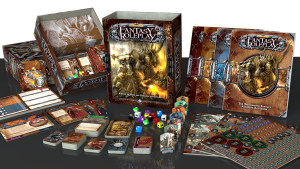
I don’t have a lot to say about 3rd edition apart from I tried it once and didn’t like it at all. Neither did Jenn. I think the picture here is appropriate compared to the previous two, as it evokes how fiddly this version became. It’s all custom dice, and little cards, and a ton of intricate rules. It felt like they were trying really hard to compete with D&D 4th edition, but by its release in 2009 that already felt like a terrible idea. Why would you want to mimic the release that fractured the D&D community?
Fourth Edition
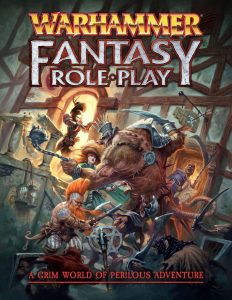
The little info about 4th edition out so far is encouraging. Much like the latest edition of D&D, it appears to be trying to return to its roots and appeal more to 1e/2e players. They’ve continued to try and make careers important, and apparently have added a system called ambitions – “personal goals for characters to work towards”. Hopefully that means career progression is also rooted in actual pragmatic rules for play.
They have said “the combat system has been designed to be quick, dynamic and exciting, with something happening as the result of every roll,” which sounds very much like a direct response to my gripe above about the slowing of combat at high levels. I sincerely hope this is true, as quick combat really appeals to my personal GMing style. If I can run combats as quickly in this as I do in old school D&D I’ll be really happy.
Finally, in a detailed discussion about skill or ability tests, one of the options appears to be a very quick GM fiat type of stat comparison, and the text says “players will need to show trust and respect to the GM – the decision will need to be accepted as logical and impartial and not signal the start of a discussion!” It seems very rare these days for any RPG to include a system that empowers the GM to make quick rulings rather than introduce complex systems in the name of “balance”. I’m really curious to read their thoughts on this.
Final Thoughts
In conclusion, the dearth of information has for some reason left me cautiously optimistic about this game. Perhaps my imagination is filling in too many gaps with my own hopes for it, but I’ll approach the game with an open mind and hope to be pleasantly surprised. We’ll see what it looks like pretty soon – it sounds like the PDF will be out in June.


